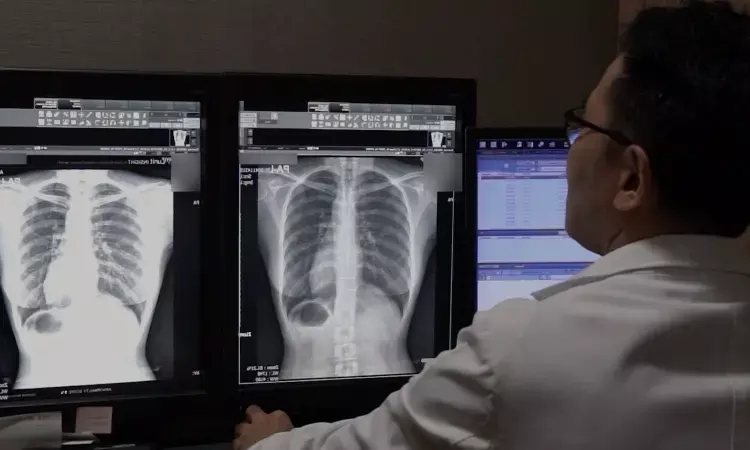- Home
- Medical news & Guidelines
- Anesthesiology
- Cardiology and CTVS
- Critical Care
- Dentistry
- Dermatology
- Diabetes and Endocrinology
- ENT
- Gastroenterology
- Medicine
- Nephrology
- Neurology
- Obstretics-Gynaecology
- Oncology
- Ophthalmology
- Orthopaedics
- Pediatrics-Neonatology
- Psychiatry
- Pulmonology
- Radiology
- Surgery
- Urology
- Laboratory Medicine
- Diet
- Nursing
- Paramedical
- Physiotherapy
- Health news
- Fact Check
- Bone Health Fact Check
- Brain Health Fact Check
- Cancer Related Fact Check
- Child Care Fact Check
- Dental and oral health fact check
- Diabetes and metabolic health fact check
- Diet and Nutrition Fact Check
- Eye and ENT Care Fact Check
- Fitness fact check
- Gut health fact check
- Heart health fact check
- Kidney health fact check
- Medical education fact check
- Men's health fact check
- Respiratory fact check
- Skin and hair care fact check
- Vaccine and Immunization fact check
- Women's health fact check
- AYUSH
- State News
- Andaman and Nicobar Islands
- Andhra Pradesh
- Arunachal Pradesh
- Assam
- Bihar
- Chandigarh
- Chattisgarh
- Dadra and Nagar Haveli
- Daman and Diu
- Delhi
- Goa
- Gujarat
- Haryana
- Himachal Pradesh
- Jammu & Kashmir
- Jharkhand
- Karnataka
- Kerala
- Ladakh
- Lakshadweep
- Madhya Pradesh
- Maharashtra
- Manipur
- Meghalaya
- Mizoram
- Nagaland
- Odisha
- Puducherry
- Punjab
- Rajasthan
- Sikkim
- Tamil Nadu
- Telangana
- Tripura
- Uttar Pradesh
- Uttrakhand
- West Bengal
- Medical Education
- Industry
AI tools can detect significant coronary artery disease from chest radiographs: Study

Italy: Artificial intelligence (AI) tools may be helpful for the detection of coronary artery disease (CAD) from chest radiographs of patients, a recent study has revealed. The study findings were produced in the International Journal of Cardiology on November 04, 2022.
A chest radiograph is one of the imaging investigations in patients referred for chest pain; it does not provide specific information for event risk stratification or diagnosis of CAD. A plain chest radiograph contains enough signs of the presence of severe CAD. Interpreting deep convolutional neural networks (DCNN) of chest radiographs can be integrated into existing stratification methods and investigations. Artificial intelligence (AI)-read chest radiographs could provide a supportive tool to estimate the pretest probability of severe CAD in individuals referred for angina.
Against the above background, Giuseppe D'Ancona, and colleagues aimed to train, test, and validate deep learning (DL) solutions for detecting significant CAD based on chest radiographs.
For this purpose, the researchers retrospectively analyzed data of patients referred for angina and undergoing coronary angiography and chest radiography. A DCNN was designed to detect CAD from anteroposterior/posteroanterior chest radiographs. The DCNN was trained for the absence or presence of severe CAD. Severe CAD was defined as stenosis severity of ≥70% for non–left main vessels and ≥ 50% for left-main. The ground truth was the coronary angiography reports.
The study led to the following findings:
- The researchers reviewed the information of 7728 patients. Severe CAD was present in 53% of the patients.
- 5454 patients were randomly divided for algorithm training (70%) and 773 for fine-tuning/model validation (10%). With the remaining 1501 patients (20%), internal clinical validation (model testing) was performed.
- DCNN prediction was the strongest predictor of severe CAD (OR: 1.040).
- Using a high-sensitivity operating cut-point, the DCNN had a sensitivity of 0.90 for detecting significant CAD (specificity 0.31; AUC 0.73).
- Adding to the AI chest radiograph interpretation, angina status improved the prediction (AUC 0.77).
"In patients referred for suspected angina, AI-read chest radiographs could be used to pretest significant probability of CAD," the researchers wrote. "Further research is needed for external validation of our algorithm, developing a clinically applicable tool, and support the screening of CAD in broader settings."
They added, "the addition of the information concerning angina status to the DCNN allowed improving the accuracy for the prediction of coronary artery disease, with sensitivity values around 90%."
Reference:
D'Ancona G, Massussi M, Savardi M, Signoroni A, Di Bacco L, Farina D, Metra M, Maroldi R, Muneretto C, Ince H, Costabile D, Murero M, Chizzola G, Curello S, Benussi S. Deep learning to detect significant coronary artery disease from plain chest radiographs AI4CAD. Int J Cardiol. 2022 Nov 5:S0167-5273(22)01665-5. doi: 10.1016/j.ijcard.2022.10.154. Epub ahead of print. PMID: 36343794.
Dr Kamal Kant Kohli-MBBS, DTCD- a chest specialist with more than 30 years of practice and a flair for writing clinical articles, Dr Kamal Kant Kohli joined Medical Dialogues as a Chief Editor of Medical News. Besides writing articles, as an editor, he proofreads and verifies all the medical content published on Medical Dialogues including those coming from journals, studies,medical conferences,guidelines etc. Email: drkohli@medicaldialogues.in. Contact no. 011-43720751


